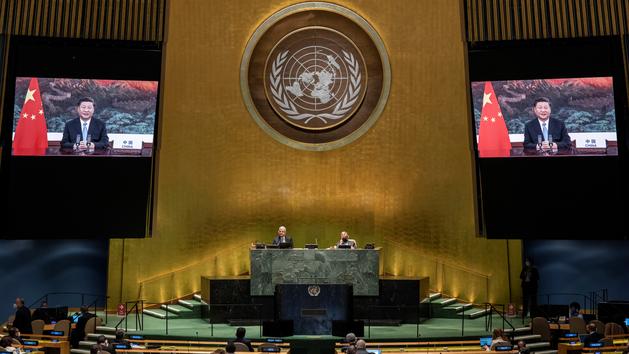The Chinese president surprised Tuesday by announcing that his country, the world's largest emitter of greenhouse gases, was aiming for carbon neutrality in forty years.
"
We aim to start lowering CO2 emissions before 2030, and achieve carbon neutrality by 2060,
" President Xi Jinping said in a virtual speech to the General Assembly of the UN.
Achieving carbon neutrality requires offsetting the last emissions that cannot be avoided by capture and storage techniques that remove it from the atmosphere.
Beijing, which ratified the global agreement concluded at the end of COP21 in 2016, will increase its climate commitments under the Paris climate agreement, he added.
"
Humanity can no longer afford to ignore nature's repeated warnings and walk the beaten path of resource extraction without investing in conservation, further development at the expense of protection and exploitation of resources without restoration,
”said the Chinese president.
Read also: CO2 emissions soon to be measured from space
Chinese greenhouse gas emissions - GHGs, responsible for global warming - have increased by nearly 55% in ten years.
According to the Global Carbon Atlas, which takes stock of CO2 emissions by state, China emitted around 10 billion tonnes of carbon dioxide in 2018, almost twice as much as the United States (5.4 billion tonnes) .
Coal occupies an overwhelming share in its emissions.
However, if we look at pollution per capita, China, with its approximately 1.4 billion inhabitants, comes in 39th position, and the United States 12th, again according to 2018 data.
"
All countries must take decisive action to honor this agreement,
" President Xi said on Tuesday.
A remark most certainly addressed to the United States, the second largest transmitter on the planet, which must formally withdraw from the Paris agreement in November.
For Li Shuo, an expert in climate diplomacy at Greenpeace, the Chinese president's announcement, which came minutes after US President Donald Trump's speech, was "
clearly a bold and well-calculated decision
."
"
This demonstrates Xi's continued interest in leveraging the climate agenda for geopolitical purposes
," the analyst quoted Reuters as saying.
"
Great challenge
"
Reducing net carbon emissions to the atmosphere to zero by mid-century is essential to limit global warming to 1.5 ° C, compared to the pre-industrial era, according to climate experts for the 'UN (the IPCC).
Admittedly, the 2060 target set by China is less ambitious than that of Europe, which aims for 2050. But "it
is undoubtedly the closest realistic date for China
", estimates Neil Hirst, researcher at the Imperial College London, quoted by AFP.
"
It is a great challenge which will involve the shutdown or the renovation of a large number of relatively modern fossil fuel power stations
", he points out.
Li Yan, of Greenpeace China, believes that this is "
a very positive signal during a difficult year for the environment and global cooperation."
"
See also: EU: The Environment Commission in favor of a reduction of greenhouse gas emissions by 60% by 2030
It remains to be seen what policies Beijing will initiate to meet this goal, China is already the world's largest market in the renewable energy sector.
For Jean-Pascal van Ypersele, former vice-president of the IPCC quoted by AFP, China will also have to be “
coherent
”, and in particular stop financing coal-fired power stations or other fossil-fuel infrastructure in Africa.

